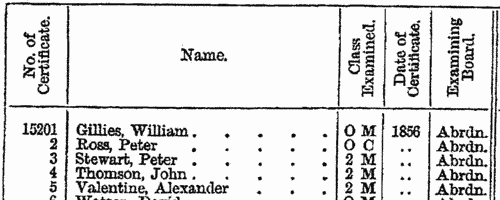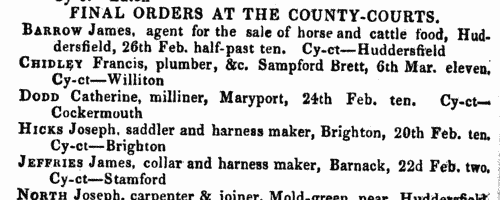Beavis Surname Ancestry ResultsOur indexes 1000-1999 include entries for the spelling 'beavis'. In the period you have requested, we have the following 171 records (displaying 81 to 90): Single Surname Subscription | | | Buying all 171 results of this search individually would cost £988.00. But you can have free access to all 171 records for a year, to view, to save and print, for £100. Save £888.00. More... |
These sample scans are from the original record. You will get scans of the full pages or articles where the surname you searched for has been found. Your web browser may prevent the sample windows from opening; in this case please change your browser settings to allow pop-up windows from this site.  London Policemen
(1843-1857) London Policemen
(1843-1857)
The Metropolitan Police Register of Joiners (MEPO 4/334) lists policemen joining the force 1 January 1843 to 1 April 1857 (warrant numbers 19893 to 35804). The register is alphabetical, in so far as the recruits are listed chronologically grouped under first letter of surname. It gives Date of Appointment, Name, Number of Warrant, Cause of Removal from Force (resigned, dismissed, promoted or died), and Date of Removal. Although the register was closed for new entrants at the end of 1842, the details of removals were always recorded, some being twenty or more years later. Those recruits not formerly in the police, the army, or some government department, were required to provide (normally) at least two letters of recommendation from persons of standing, and details of these are entered on the facing pages: the names in these are indexed separately - this index refers only to the police constables. Where a recruit was only recently arrived in the metropolis, the names and addresses of the recommenders can be invaluable for tracing where he came from.BEAVIS. Cost: £8.00.  | Sample scan, click to enlarge

|  Persons of standing recommending London police recruits
(1843-1857) Persons of standing recommending London police recruits
(1843-1857)
The Metropolitan Police Register of Joiners (MEPO 4/334) lists policemen joining the force 1 January 1843 to 1 April 1857 (warrant numbers 19893 to 35804). The register is alphabetical, in so far as the recruits are listed chronologically grouped under first letter of surname. It gives Date of Appointment, Name, Number of Warrant, Cause of Removal from Force (resigned, dismissed, promoted or died), and Date of Removal. Although the register was closed for new entrants at the end of 1842, the details of removals were always recorded, some being twenty or more years later. Those recruits not formerly in the police, the army, or some government department, were required to provide (normally) at least two letters of recommendation from persons of standing, and details of these are entered on the facing pages. Where a recruit was only recently arrived in the metropolis, the names and addresses of the recommenders can be invaluable for tracing where he came from. Those recruits not formerly in the police, the army, or some government department, were required to provide (normally) at least two letters of recommendation from persons of standing, and details of these are entered on the facing pages: the names in these are indexed here (the police recruits are indexed separately and not included here). Recruits transferred from other forces or rejoining the force did not normally need recommendations - in the latter case, former warrant numbers are given - but some recommendations are from police inspectors, even other constables. Recruits coming from the army sometimes have general military certificates of good conduct, but most often have a letter from their former commanding officer; recruits recommended by government departments (most often the Home Office) similarly have letters from the head of department. But the great majority of the names and addresses in these pages are of respectable citizens having some sort of personal acquaintance with the recruit. Where more than two recommendations were provided, the clerk would only record one or two, with the words 'and others'. Tradesmen are sometimes identified as such by their occupations; there are some gentry. Although the bulk of these names are from London and the home counties, a scattering are from further afield throughout Britain and Ireland. BEAVIS. Cost: £8.00.  | Sample scan, click to enlarge

| Masters and Mates of Merchantmen: Certificates of Competency
(1857)
The Mercantile Navy List and Annual Appendage to the Commercial Code of Signals for All Nations, edited by J. H. Brown, was published By Authority in 1857. It includes this full list of 'Masters and Mates who have passed their examination and obtained Certificates of Competency', from number 1 to number 15816, except for those whose certificates had been cancelled. The first column gives the number of certificate; the second column full name, surname first (an asterisk before the name denotes those who are found qualified to act in fore and aft-rigged vessels only; two vertical lines denotes in North Wales fishery only; a double dagger, passed the examination in steam; and a dagger refers to honorary testimonials, details of which are printed at the end of the section. A B C D are the distinguishing letters for the four classes of Meteorological Observers); third column, class examined (1 ex, 1, 2 and 3 denote First Extra, First, Second and Third Class Master's Certificate, granted under the Voluntary Examination, by Order in Council dated August 1845; Ex C, Master Extra; O C, Master Ordinary; 1 M, First Mate; O M, Only Mate; 2 M, Second Mate; L. R. N., Lieutenant Royal Navy; M. R. N., Master Royal Navy; E. I. C., East India Company; M. I. N., Master Indian Navy.); fourth column, year of certificate (where there are two dots, this is to represent a 'ditto' to the year next above); fifth column, Examining Board (Aberdeen, Belfast, Bristol, Cork, Dublin, Dundee, Glasgow, Greenock, Hull, Leith, Liverpool, London, Newcastle, Plymouth, Shields or Sunderland).BEAVIS. Cost: £4.00.  | Sample scan, click to enlarge

| Insolvents in England and Wales
(1858)
Perry's Bankrupt and Insolvent Gazette, issued monthly, included lists of insolvencies and stages in the process whereby the insolvents petitioned for release from debtors' prison. The insolvent is generally referred to by name (surname first), address and trade. This is the index to the names of the insolvents, from the issues from January to December 1858.BEAVIS. Cost: £6.00.  | Sample scan, click to enlarge

| Civil Service Certificates
(1859)
The Civil Service Commission published this annual list of all persons who had obtained certificates of qualification for appointment in the various public departments. The list gives full name (surname first); department (such as Post Office, or Inland Revenue); situation (such as Letter-carrier, or Clerk); and date of certificate. Candidates whose names are preceded by a dagger obtained appointments as the result of competition. A double dagger shows those who obtained their appointments as the result of open competition. Those whose names are preceded by an asterisk obtained honorary additions to their certificates either for proficiency in extra subjects chosen by themselves, or for marked proficiency in the prescribed subjects.
BEAVIS. Cost: £4.00.  | Sample scan, click to enlarge

|  British infantry fighting in China
(1860) British infantry fighting in China
(1860)
The China Medal was awarded to soldiers and sailors who took part in the prosecution of the war against the Chinese from 1856 to 1860. Separate clasps were awarded for men who had been in receipt of the China Medal of 1842; for being actually present at Canton on 28 and 29 December 1857, when that city was bombarded and finally captured; for being actually engaged in the operations which ceased with the first capture of the Taku Forts, 20 May 1858, and led to the Treaty of Tientsin; for being actually present at the capture of the Taku Forts 21 August 1860; and for being actually present before Pekin the day the gate of that city was given up to the allied (British and French) army, viz. on 13 October 1860. The 44th (The East Essex) Regiment of Foot, based at Colchester, having returned from the Crimea, embarked for India 26 August 1857, and was transferred thence to China. The regiment took part in the capture of the Taku Forts.BEAVIS. Cost: £8.00.  | Sample scan, click to enlarge

|  British riflemen fighting in China
(1860) British riflemen fighting in China
(1860)
The China Medal was awarded to soldiers and sailors who took part in the prosecution of the war against the Chinese from 1856 to 1860. Separate clasps were awarded for men who had been in receipt of the China Medal of 1842; for being actually present at Canton on 28 and 29 December 1857, when that city was bombarded and finally captured; for being actually engaged in the operations which ceased with the first capture of the Taku Forts, 20 May 1858, and led to the Treaty of Tientsin; for being actually present at the capture of the Taku Forts 21 August 1860; and for being actually present before Pekin the day the gate of that city was given up to the allied (British and French) army, viz. on 13 October 1860. The 2nd battalion, the 60th (The King's Royal Rifle Corps) Regiment, based in Winchester, embarked for the Cape of Good Hope in June 1851, and after taking part in the Kaffir War, was moved to India, where it helped deal with the Mutiny. In 1860 the battalion was transferred to China. The regiment took part in the capture of the Taku Forts and that of Pekin.BEAVIS. Cost: £8.00.  | Sample scan, click to enlarge

|  Men of the 50th Regiment who fought in the New Zealand War
(1863-1870) Men of the 50th Regiment who fought in the New Zealand War
(1863-1870)
New Zealand War Medal roll for the 50th (The Queen's Own) Regiment of Foot: for service in the New Zealand campaign 1863 to 1867: the rolls were compiled following a general order in 1869 and the medals were distributed in 1870. BEAVIS. Cost: £8.00.  | Sample scan, click to enlarge

| Isle of Wight Electors: Newport: for Cochrane
(1870)
'Poll Book at the Election of a Knight of the Shire for the County of the Isle of Wight taken on the 10th day of June, 1870. Candidates: - George Moffatt, Esq. and Baillie Cochrane, Esq.' The electors are listed by polling district (Newport, Ryde, Ventnor, West Cowes and Yarmouth), in three categories - those who voted for Moffatt, those for Cochrane, and those unpolled - giving full name and place of abode.BEAVIS. Cost: £6.00.  | Sample scan, click to enlarge

| Isle of Wight Electors: Newport: Unpolled
(1870)
'Poll Book at the Election of a Knight of the Shire for the County of the Isle of Wight taken on the 10th day of June, 1870. Candidates: - George Moffatt, Esq. and Baillie Cochrane, Esq.' The electors are listed by polling district (Newport, Ryde, Ventnor, West Cowes and Yarmouth), in three categories - those who voted for Moffatt, those for Cochrane, and those unpolled - giving full name and place of abode.BEAVIS. Cost: £6.00.  | Sample scan, click to enlarge

|
Research your ancestry, family history, genealogy and one-name study by direct access to original records and archives indexed by surname.
|













